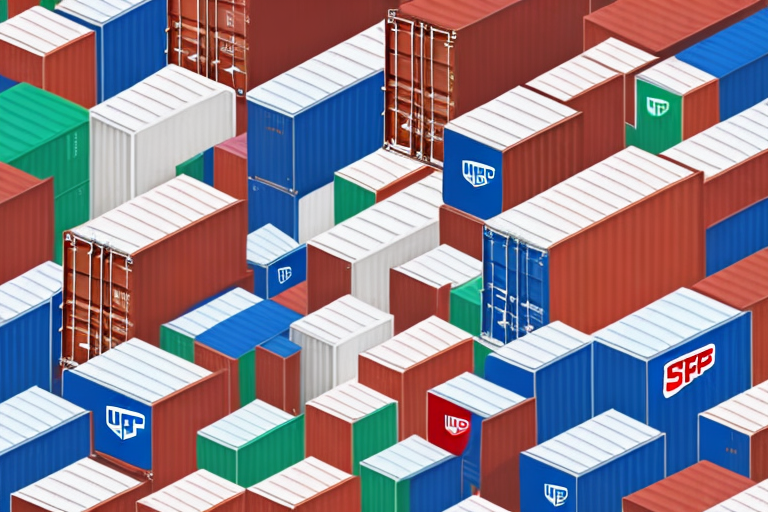Comparing International Shipping Rates for UPS, USPS, and FedEx
If you're sending packages internationally, there are several factors to consider before choosing a carrier. Shipping rates are one of the most important factors, but they aren't the only consideration. In this article, we'll take a closer look at the pros and cons of using UPS, USPS, and FedEx for international shipping.
Understanding the Different Shipping Options Available
Before diving into each carrier's rates, it's essential to understand the different shipping options available for international deliveries. Depending on the carrier, you may have the option to choose from first-class mail, priority mail, express mail, and various other shipping services. Each option comes with its own delivery time frame and cost, so it's important to select the service that meets your needs as well as your budget.
It's also crucial to consider the type of item you are shipping when choosing a shipping option. Fragile or valuable items may require additional packaging and handling, which could affect the cost and delivery time. Some carriers offer insurance options for high-value items, providing added peace of mind during the shipping process. Additionally, certain shipping options include tracking and delivery confirmation, which can be beneficial for both the sender and recipient.
The Pros and Cons of Using UPS for International Shipping
UPS offers a variety of international shipping services, including air and ground transport, as well as customs clearance assistance. One advantage of using UPS is their extensive network of international partners, allowing deliveries to over 220 countries and territories. However, this extensive coverage can come at a higher cost, as UPS tends to have relatively high shipping rates compared to other carriers.
Another advantage of UPS for international shipping is their advanced tracking system. Customers can track their packages in real-time and receive updates on the status of their shipments, providing peace of mind and aiding in delivery planning. On the downside, UPS's delivery times may be longer than other carriers, especially for international shipments that require customs clearance. Additionally, some customers have reported issues with lost or damaged packages when using UPS for international shipping.
USPS International Shipping: Is it a Viable Option?
USPS offers a range of international shipping services, including Priority Mail International, Priority Mail Express International, and First-Class Mail International. These services can be cost-effective for lighter packages, but they may not be as fast and reliable as other carriers. Additionally, USPS doesn't offer customs clearance assistance, so you'll need to handle that yourself.
However, USPS offers some advantages over other carriers. For example, they have a wider network of delivery locations, including remote areas that other carriers may not service. They also provide flat-rate pricing for certain packages, which can be a cost-effective option for heavier items.
It's important to note that USPS international shipping may not be the best option for every situation. If you need a package to arrive quickly or require customs assistance, you may want to consider using a different carrier. It's always a good idea to compare shipping options and prices before making a decision.
FedEx International Shipping: How Does it Compare?
FedEx offers a range of international shipping services, including FedEx Express, FedEx Ground, and FedEx Freight. They also provide customs clearance assistance, making it easier to navigate customs regulations in different countries. One potential downside of using FedEx is that they tend to have higher rates for heavier packages.
However, FedEx's international shipping services are known for their reliability and speed. They offer guaranteed delivery times for their FedEx Express service, which is a significant advantage for businesses that need to get their products to customers quickly. Additionally, FedEx has a strong global network, with a presence in over 220 countries and territories. This extensive network allows them to offer shipping to even the most remote locations, making them a great option for businesses with a global customer base.
Factors that Affect International Shipping Rates
When comparing international shipping rates, several factors can affect the cost. These include the weight and size of the package, the destination country, the shipping service selected, and any additional services such as insurance or customs clearance. Understanding these factors is essential to obtaining an accurate quote for your shipment.
Another factor that can influence international shipping rates is the mode of transportation. Shipping by air is generally faster but more expensive than shipping by sea. Conversely, shipping by sea may take longer but can be more cost-effective for larger shipments.
The time of year can also impact international shipping rates. During peak seasons, such as the holiday period, shipping rates may be higher due to increased demand. Planning ahead and booking your shipment in advance can help avoid unexpected price increases.
How to Choose the Best Carrier for Your Needs
When selecting a carrier for your international shipment, it's important to consider not only the shipping rates but also the carrier's reliability, speed, and customer service. Additional services, such as customs clearance assistance or package tracking, should also be considered. Ultimately, choose the carrier that offers the best overall value for your specific needs.
Another crucial factor is the carrier's coverage area. Some carriers may have limited coverage in certain regions or countries, which could result in longer transit times or higher shipping costs. Research the carrier's coverage area to ensure they can deliver to your desired destination in a timely and cost-effective manner.
Tips for Saving Money on International Shipping Fees
If you're looking to save money on international shipping fees, consider several strategies:
- Choose a slower shipping service: Opting for a shipping service with a longer delivery time frame can be less expensive.
- Negotiate rates: Work with your carrier to negotiate better shipping rates, especially if you ship frequently.
- Use online shipping calculators: Compare rates from different carriers using online shipping calculators to find the best deal.
- Efficient packaging: Use the smallest box or envelope that will safely contain your items and lightweight packing materials to reduce weight and size.
- Consolidate shipments: Combine multiple shipments into one larger shipment to often benefit from lower overall shipping costs.
Understanding Customs Duties and Taxes for International Shipments
When shipping internationally, your shipment may be subject to customs duties and taxes imposed by the destination country. These fees can vary depending on the value of the shipment and the import regulations in the destination country. Researching these fees before shipping can help avoid any surprises.
Additionally, some countries have restrictions on certain items that can be imported. For example, certain foods, plants, or electronics may be prohibited. It's crucial to research the import regulations of the destination country and ensure that your shipment complies with these regulations to avoid delays or confiscation of your items.
The Importance of Proper Packaging and Labeling for International Shipments
Proper packaging and labeling are essential for international shipments. Your package may be subject to harsh conditions during transportation, so it's important to use sturdy materials and adequate padding. Clear and accurate labeling helps avoid confusion or delays in transit.
Compliance with customs regulations is another critical aspect of packaging for international shipments. Different countries have varying rules regarding the types of materials that can be shipped and labeling requirements for certain products. Failure to comply can result in your package being held up in customs or even returned to the sender.
Moreover, proper packaging and labeling help prevent damage or loss of your shipment. Clearly labeling your package with the recipient's address and contact information ensures it arrives at its intended destination. Using appropriate packaging materials and padding protects your items from damage during transit, reducing the risk of loss or breakage.
Common Mistakes to Avoid When Shipping Internationally
When shipping internationally, avoid these common mistakes:
- Improper packaging: Ensure your items are securely packaged to prevent damage.
- Inaccurate labeling: Double-check addresses and contact information to avoid delivery issues.
- Insufficient insurance coverage: Consider insuring valuable items to protect against loss or damage.
- Failing to research customs regulations: Understand the import regulations of the destination country to ensure compliance.
- Not considering shipping costs and delivery time: Compare shipping options to find the most cost-effective and efficient method.
- Ignoring customs fees or taxes: Factor in any additional costs that may apply in the destination country.
By properly preparing your shipment, you can avoid these pitfalls and ensure that your package arrives safely and on time.
Navigating the Complexities of International Shipping Regulations
International shipping regulations can be complicated and vary depending on the destination country. Researching these regulations before shipping is crucial to avoid customs violations or transit delays. If you're unsure about any regulations, contact your carrier or a customs broker for assistance.
Common regulations to be aware of include restrictions on certain items, such as hazardous materials or products made from endangered species. Additionally, some countries may require specific documentation or labeling for certain products. Stay updated on any changes to regulations, as they can frequently be revised. By staying informed and taking necessary precautions, you can ensure a smooth and successful international shipping experience.
Meeting the Unique Requirements of Different Destinations
Each destination country has its own unique requirements for international shipments. These may include specific labeling requirements, import regulations, and customs clearance procedures. Researching these requirements before shipping ensures that your package meets all necessary standards and regulations.
Tracking and Managing Your International Shipments Effectively
Tracking and managing your international shipments can be challenging, especially if you're sending multiple packages or shipping to various destinations. Fortunately, many carriers offer online tracking and management tools that can help you monitor your shipments and check their delivery status in real-time.
Conclusion: Which Carrier is Right for You?
When it comes to international shipping, there is no one "best" carrier. Each carrier has its own unique strengths and weaknesses, and the best carrier for your needs will depend on various factors. By understanding the different shipping options available, researching fees and regulations, and choosing the carrier that offers the best overall value, you can ensure that your international shipments arrive safely and on time.


















